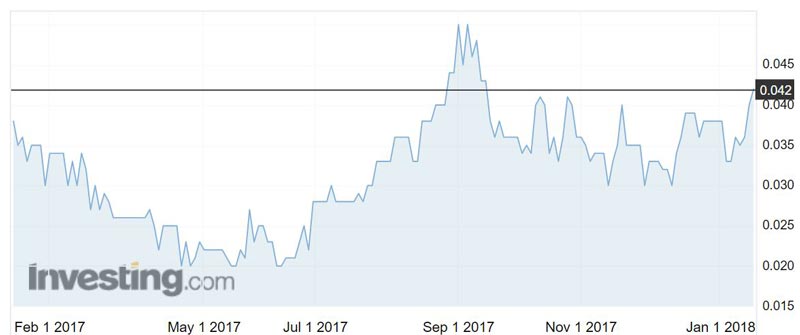What’s got investors so fired up about ‘under-the-radar’ Allegiance Coal?
Mining
Allegiance Coal is starting to garner a bit of attention from investors over suggestions it could be worth nearly nine times its current share price once it hits production in 2019.
Allegiance (ASX:AHQ) is now trading at 4.2c, giving it a market cap of just $16 million.
Since early June last year, its share price has more than doubled from a 52-week low of 2c.
Allegiance is earning into the Telkwa metallurgical coal project in northwest British Columbia, Canada. The company has so far acquired a 20 per cent stake and can earn up to 90 per cent by meeting certain milestones.
A report by Independent Investment Research placed a base case valuation of 37c per share for a small start-up operation and a much higher valuation of 82c per share once it expands to 1.75 million tonnes per annum.
As a result, some investors believe Allegiance is “currently under the radar”.
The mine itself is adjacent to a rail line that is located just 375km from an under-utilised coal terminal.
To shorten the development timeline and bring cash flows forward, Allegiance decided it would start with a low-cost mine producing 250,000 tonnes per annum of either pulverised coal injection (PCI) or semi soft coking coal.

Coking coal is essential to the manufacture of blast-furnace coke and foundry coke, which is used in steel production. PCI coking coal is a type of coal used in steel production that can partially replace coke in the process of solid iron ore melting in blast furnaces.
Prospects sparking for coking coal
The outlook for coking coal is much better than for its relative, thermal coal, due to the anticipated continuation of strong demand for steel.
The Telkwa mine would have a 19-year life with a low strip ratio, which would deliver life-of-mine all-in cash costs before tax of $US54 ($67.59) per tonne — less than half the current spot price.
This would position the operation within the lowest five-percentile of the global seaborne metallurgical coal cost curve, according to resources expert Gavin Wendt.
“The strip ratio is less than 2-to-1, which means that mining costs are low,” Mr Wendt told Stockhead. “So it’s the thing that differentiates them from a lot of bulk commodity projects where you’ve got to move a lot of earth and it’s all about economies of scale. Operating costs are low, so the payback is relatively fast.”
The initial operation would also have an estimated capital cost of US$35 million, which Independent Investment Research believes should make it easy to finance.
“From my perspective they haven’t over-promoted the story,” Mr Wendt said. “They’ve just let the project numbers speak for themselves.”
Allegiance plans to sell Telkwa metallurgical coal into the global seaborne market, targeting Asian customers.
Due to the potential for supply disruptions out of Australia, the world’s largest exporter, Asian steelmakers have sought diversity of supply.
China is the largest consumer of metallurgical coal, sucking up over 60 per cent of global production, followed by India (10 per cent), Russia (6 per cent), Japan (5 per cent) and South Korea (4 per cent).
Institutional backing
Allegiance is acquiring the Telkwa project from diversified mining royalty company Altius Minerals.
Toronto Stock Exchange-listed Altius has a market cap of around $C520 million and generates around $C65 million each year of royalty revenue, with current available liquidity for investment of around $C150 million.
Altius has been a substantial shareholder in Allegiance since it acquired the Telkwa project in late 2016 and currently owns a 14.3 per cent stake.
“There’s not a lot of emerging coal producers out there, but if you look at companies at similar stages of advancement in other commodities, you’d be hard pressed to find anything that had a market cap of $16 million with this sort of level of advancement that’s going to generate the level of returns and rapid payback that Allegiance has the potential to generate,” Mr Wendt said.
“The obvious options are: one they can get funding and get up and running, or somebody is going to come along and make them an offer that’s too good to refuse and they’re able to generate a really good corporate outcome for their shareholders.”
This article does not constitute financial product advice. You should consider obtaining independent advice before making any financial decisions.